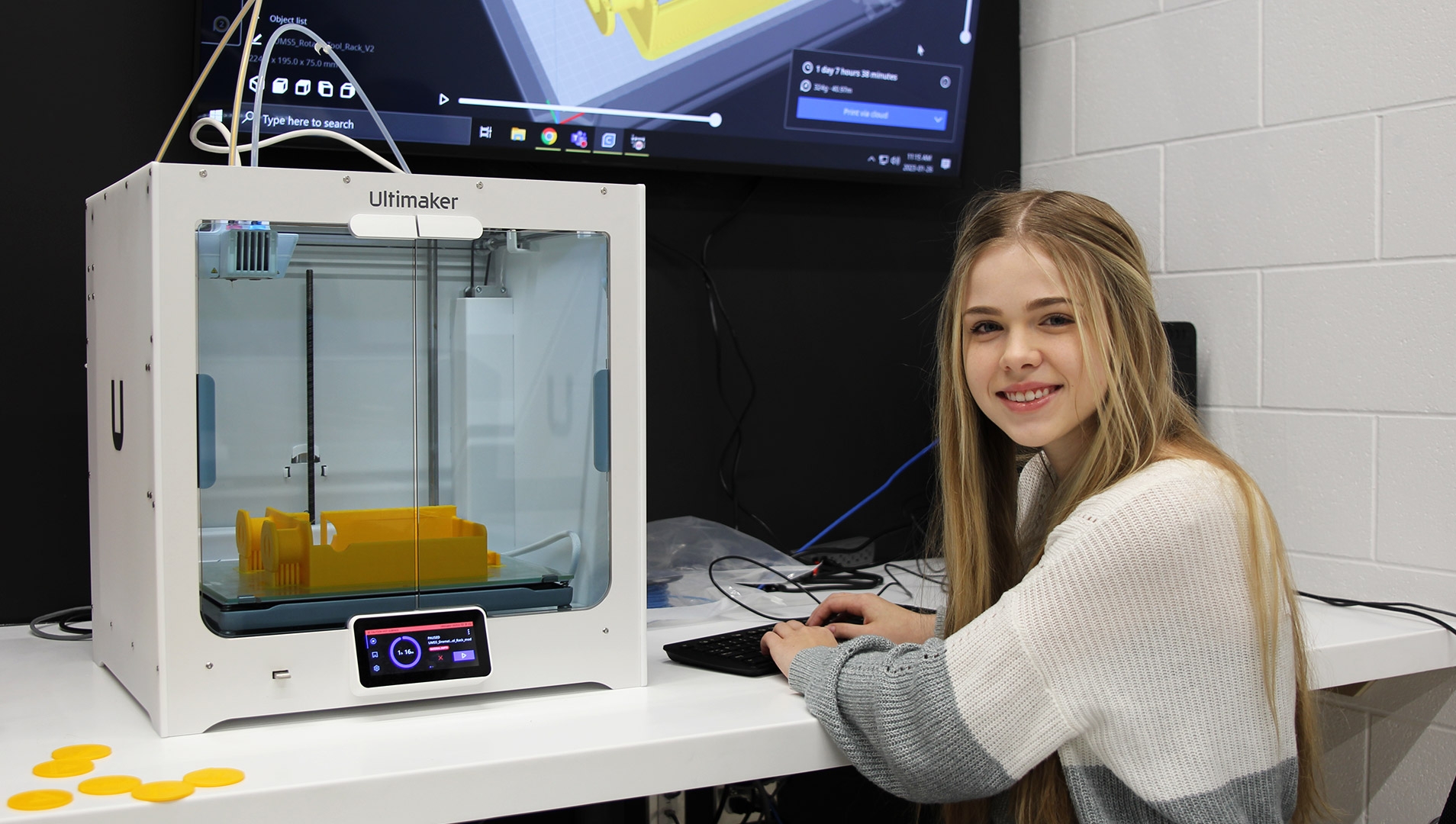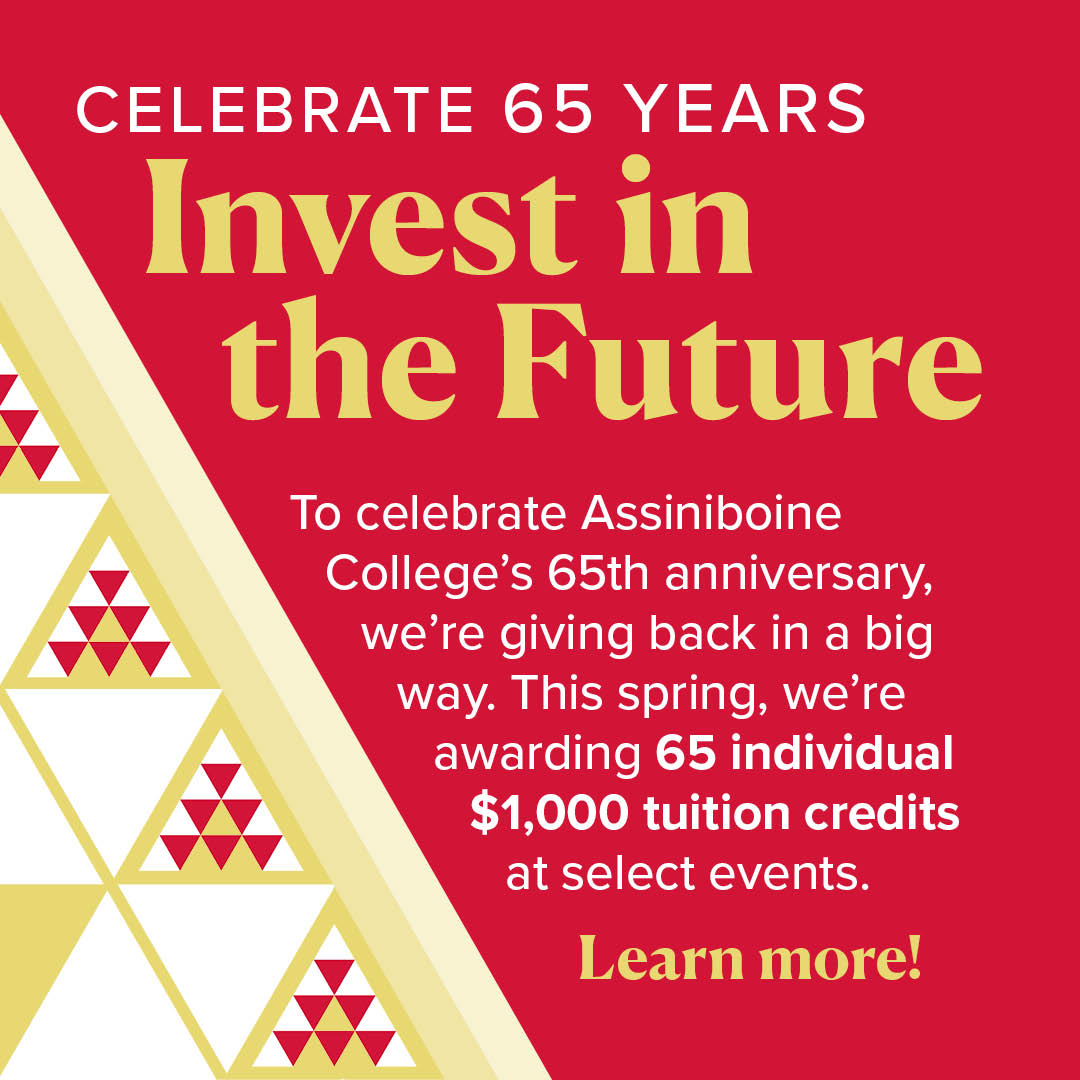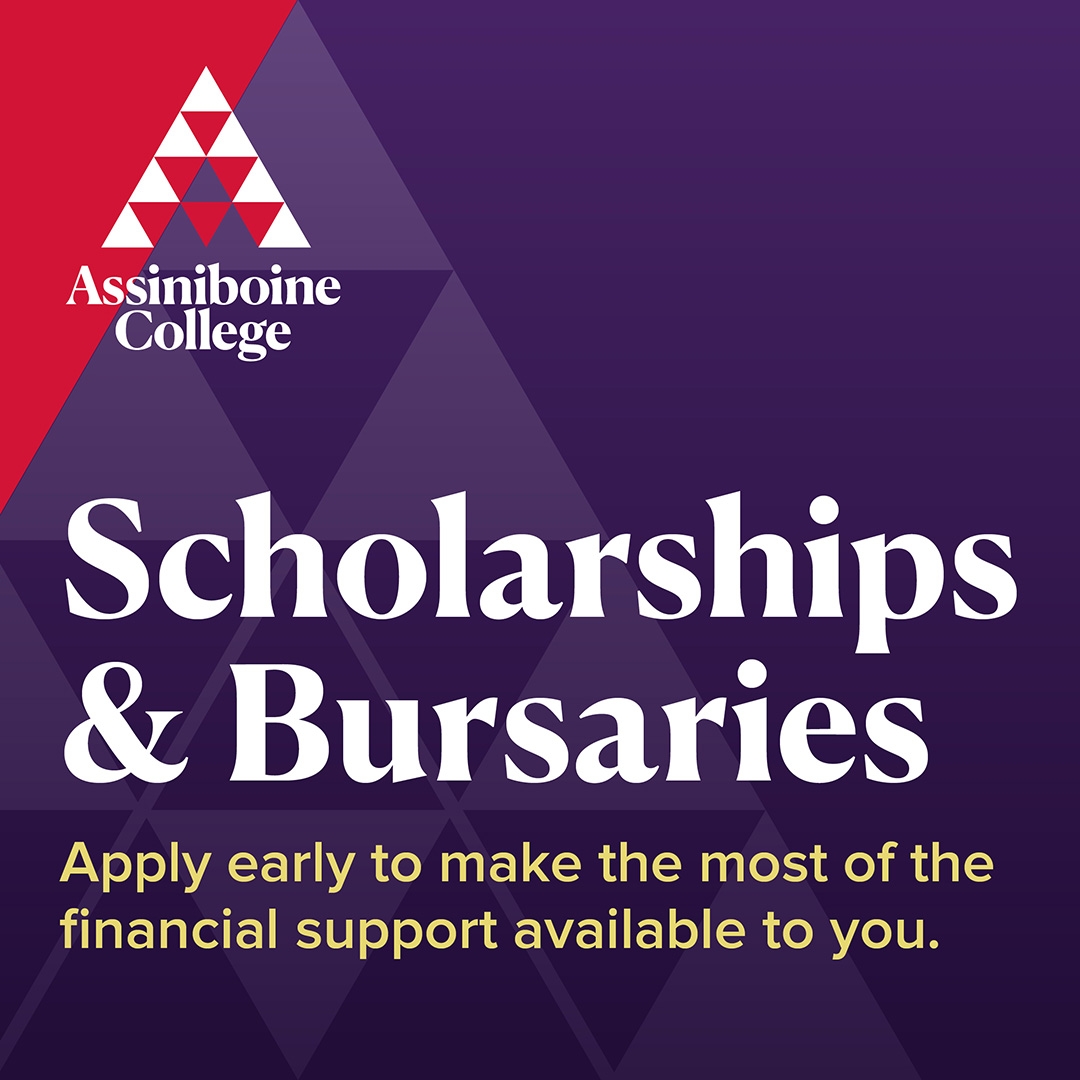Digital Art and Design
Overview
Assiniboine’s two-year Digital Art and Design program prepares graduates to enter the workforce as a valuable member of a creative team or as a freelance specialist.
Digital Art and Design graduates conceptualize and produce graphical and multimedia content for publications, advertising, films, packaging, posters, signs and interactive media.
Graduates of the Digital Art and Design program find exciting and challenging entry level opportunities as web and interface designers, graphic designers, motion graphic artists and digital artists. Prospective employers include design firms, advertising agencies, game development studios, and in-house creative departments of larger companies. Entrepreneurs find additional options with freelance contracts. Graduates may apply their skills in the areas of digitally-based business solutions, broadcast graphics, digital entertainment and web-delivered training.
Classes for this program are taught at Assiniboine's Centre for Creative Media - a cutting-edge, multi-functional space with state-of-the-art equipment.
Program Learning Outcomes
- Develop and implement design concepts for web and interface design, graphic, motion graphics, and digital art using industry-standard tools and software.
- Create visually engaging designs that effectively communicate messages and meet the needs of target audiences across different mediums, including websites, apps, print materials, virtual reality, augmented reality, and various other media presentations.
- Apply principles of design and aesthetics to their work, including color theory, typography, composition, and visual hierarchy.
- Use industry-appropriate design software and technology, and other industry-standard tools, to create and produce professional-quality design work.
- Develop and present design solutions that meet the needs of clients and stakeholders, while also demonstrating their ability to think critically and creatively.
- Collaborate effectively with others, including clients, team members, and stakeholders, while demonstrating effective communication skills, problem-solving skills, and the ability to work well in a team.
- Adapt to new technologies and design trends, demonstrating a willingness to learn and grow as designers and artists.
- Demonstrate professionalism and self-awareness while giving and receiving constructive feedback to improve their skills knowledge and professional practice.
- Complete work within industry standards and best practices, including legal and ethical and accessibility considerations.
- Apply critical thinking and problem-solving skills to address challenges and develop solutions in a fast-paced environment.
Examples of what graduates from this program can do:
- Design and produce aesthetically pleasing and purposeful high-end visual content (graphics, 2-D and 3-D motion graphics, user experiences for multiple platforms, elements of virtual and augmented reality environments, etc.) that solves real-world client problems.
- Create visual elements that meet the clients' objectives.
- Use traditional tools, media software, image processing software and layout and design software to prepare sketches, layouts, and graphic elements of the subjects to be rendered.
- Collaborate effectively with team members and clients to deliver creative and results-oriented solutions.
Success Factors
You might be a good fit for this program if you would enjoy:
- Art and drawing
- Collaborating and connecting with others
- Listening to others and turning their words into a visual reality
- Telling compelling stories
A valid driver’s license and access to a vehicle is strongly recommended given the potential need to travel for practicum placement.
The industry and program environment require individuals to:
- Be reliable, punctual, and regularly attend work.
- Communicate effectively with team members and clients.
- Continually seek and be open to feedback and critiques.
- Listen to direction and act on that accordingly.
- Maintain professionalism and attention to detail and quality of work under tight deadlines and in a fast-paced environment.
- Manage projects and time effectively, meeting deadlines and delivering work within industry standards and best practices.
- Perform static tasks, such as sitting and using a computer.
- Perform physical tasks, such as operating and maintaining equipment of various sizes.
- Use and keep up to date with changes in technology and be willing to continuously learn and adapt.
- Work in a collaborative team environment or independently as the situation requires.
- Take ownership of work and be accountable for meeting deadlines, communicating progress, and solving problems independently as they arise.
Interested in exploring similar program options?
We've got you covered! Here are some other great program options to consider.
Admissions
Admission Requirements
- A complete Manitoba Grade 12 or equivalent
- English 40G/40S or equivalent with a minimum mark of 65%
If you received your education outside of Manitoba, please review the equivalent admission requirements: Interprovincial or International.
English is the language of instruction at Assiniboine. All applicants educated outside of Canada or in a country not on the test exempt list are expected to meet the English language proficiency requirements.
READY TO TAKE THE NEXT STEP IN YOUR EDUCATION JOURNEY?
Start your online application today and join Assiniboine College!
DON'T MEET ADMISSION REQUIREMENTS?
If you don’t meet admission requirements, visit our Centre for Adult Learning to upgrade courses.
Careers & Connections
Career Opportunities
- Design firms
- Advertising agencies
- Game development studios
- In-house creative departments
- Entrepreneurs
- Freelance
Connections
Assiniboine has a number of agreements with other colleges, universities and professional organizations, making it possible to apply credit taken at Assiniboine to programs at other institutions. For information on agreements, see Articulation Agreements.
Tools & Supplies
Program Checklists, Textbooks, and Supplies
Program Checklists:
Supplies:
ASSINIBOINE BOOKSTORE
Textbooks, supplies and uniforms may be purchased at the Assiniboine Bookstore at the Victoria Avenue East Campus. Booklists are available from your school office 30 days prior to the start date of your program.
Technology Requirements
Students in this program are required to bring their own laptop for use on-campus. The laptop must meet the technical needs outlined by the program. See Technology Requirements for detailed information.
Courses & Costs
Costs
Estimated Program Costs (Domestic students)
| Year 1 | Year 2 | |
|---|---|---|
| Credits | 60.0 | 61.0 |
| Tuition | $3,720 | $3,720 |
| Course Fees | $1,440 | $1,960 |
| Students' Association fees (including Health Premium) | $580 | $580 |
| Estimated textbooks, tools, and supplies | $4,730 | $320 |
All fees are estimated and subject to change without notice.
Estimated Program Costs (International students)
| Year 1 | Year 2 | |
|---|---|---|
| Credits | 60.0 | 61.0 |
| Tuition | $16,140 | $16,350 |
| Course Fees | $1,440 | $1,960 |
| Students' Association fees (including Health Premium) | $580 | $580 |
| Required Health Insurance | $750 | $750 |
| Estimated textbooks, tools, and supplies | $4,730 | $320 |
All fees are estimated and are subject to change without notice. All international students must purchase health insurance. The college adds this fee to your student account and then sends your name and fee to the insurance provider on your behalf.
For more information, visit the Fees and Charges page.
Courses
To graduate with a Digital Art and Design diploma, students must successfully complete 120 academic credits and 1 practical credit. The minimum passing grade for each course is indicated on the course outline. Course offerings are subject to change and may vary by intake.
Year One Courses
| Title | Credits/CEUs | Elective | Distance | PLAR |
|---|---|---|---|---|
Art & Design Fundamentals (ARTS-0022)In this course, students study design fundamentals like elements & principles of design, typography concepts, and layout techniques that can be applied in a variety of media. Students use theory of value, harmony and contrast to help them create unified designs that evoke emotional responses from audiences. Aspects of indigeneity are incorporated by exploring traditional indigenous colours and symbols, and their meanings. Students use design thinking and problem-based learning processes to help them acquire critical and analytical skills they use throughout the program. |
6 credit(s) | No | No | No |
Art, 3D & Motion (ARTS-0021)Prerequisites: ARTS-0022 Art & Design Fundamentals, COMP-0624 Software Skills |
6 credit(s) | Yes | No | No |
Business & Entrepreneurship 1 (BUSN-0194)This course introduces students to basic practices and processes of professional development. Students learn processes and tools for project planning and management, as well as self-management of contractual work. Students propose and present projects and ideas in a clear and engaging manner. Development of self-awareness and self-regulation processes is a component of course. |
6 credit(s) | No | No | No |
College Foundations (PEDV-0356)This course improves students' ability to navigate the college experience and environment, including student's rights, roles, and responsibilities. In this course, students reflect on their skills, attitudes, and expectations and develop learning strategies to help them to become successful, resilient, and self-directed learners. The course covers topics such as success in online learning, time management strategies, learning strategies, assessment taking strategies, academic integrity, information and digital literacy, and wellness, among others. It integrates elements of student orientation. |
0 credit(s) | No | No | No |
Digital Art & Design Studio 1 (COMP-0620)Prerequisites: ARTS-0022 Art & Design Fundamentals, COMP-0624 Software Skills, MEDP-0100 Studio Skills |
6 credit(s) | No | No | No |
Front-End Development (MEDP-0097)Prerequisites: COMP-0623 Programming Fundamentals, ARTS-0022 Art & Design Fundamentals, COMP-0624 Software Skills |
6 credit(s) | Yes | No | No |
Interactive Communications (COMM-0400)This course prepares students to convey messages clearly, directly, and succinctly for a range of audiences. A variety of texts and communication methods, styles, and structures are examined, as well as best practices and ethical considerations for each. Research and project planning skills are introduced in this course. |
6 credit(s) | No | No | No |
Programming Fundamentals (COMP-0623)In this introductory course, students are introduced to many of the common coding concepts that comprise a solid foundation in just about any programming language. Processes of project and file management are further expanded on for work in networked environments. |
6 credit(s) | No | No | No |
Software Skills (COMP-0624)This course provide an introduction and overview of the industry standard software tools used for media production. Students select appropriate strategies and tools to develop digital content. Best practices in production collaboration & management methods are emphasized. Students gain an introductory understanding of the tools necessary to edit content. |
6 credit(s) | No | No | No |
Storytelling & Content Writing (COMM-0401)Since before the birth of civilization, human beings have used stories to understand and explain the world. Today, stories are incorporated into many forms of digital communication. This course provides students with the foundational skills to craft original, compelling stories to help make an impression with audience. This course exposes students to aspects of indigeneity by exploring the history and importance of oral storytelling. |
6 credit(s) | No | No | No |
Studio Skills (MEDP-0100)This course introduces students to technical gear needed to capture and edit professional quality video, audio, and images. Focus is placed on the professional details, fundamental skills, and best practices for successfully acquiring, sequencing, and presenting media content. Students troubleshoot technical issues related to cameras, video and audio gear, as well as how to communicate amongst team members using industry terminology and procedures. |
6 credit(s) | No | No | No |
Typography & Brand (COMM-0402)Prerequisites: ARTS-0022 Art & Design Fundamentals, COMP-0624 Software Skills |
6 credit(s) | No | No | No |
Year Two Courses
| Title | Credits/CEUs | Elective | Distance | PLAR |
|---|---|---|---|---|
Business & Entrepreneurship 2 (BUSN-0195)Prerequisites: BUSN-0194 Business & Entrepreneurship 1, COMM-0400 Interactive Communications |
6 credit(s) | No | No | No |
Digital Art & Design Studio 2 (COMP-0621)Prerequisites: COMP-0620 Digital Art & Design Studio 1; MEDP-0096 Editorial Design & Production; COMM-0402 Typography & Brand; ARTS-0021 Art 3D & Motion |
12 credit(s) | Yes | No | No |
Editorial Design & Production (MEDP-0096)Prerequisites: COMM-0402 Typography & Brand, COMP-0620 Digital Art & Design Studio 1 and MEDP-0097 Front-End Development or ARTS-0021 Art, 3D & Motion |
12 credit(s) | No | No | No |
Integrative Capstone 1 - DGADS (MEDP-0106)Prerequisites:COMM-0402 Typography & Brand, COMP-0620 Digital Art & Design Studio 1, BUSN-0194 Business & Entrepreneurship 1, COMM-0401 Storytelling & Content Writing |
6 credit(s) | No | No | No |
Integrative Capstone 2 - DGADS (MEDP-0107)Prerequisites: MEDP-0106 Integrative Capstone 1-DGADS; MEDP-0096 Editorial Design & Production; MEDP-0101 User Experience Design |
6 credit(s) | No | No | No |
Interactive Development (MEDP-0098)Prerequisite: MEDP-0097 Front-End Development |
6 credit(s) | Yes | No | No |
Mobile App Design Development (MEDP-0099)Prerequisite: MEDP-0101 User Experience Design; MEDP-0097 Front End Development |
6 credit(s) | Yes | No | No |
Online Marketing (MKTG-0068)Prerequisites: BUSN-0195 Business & Entrepreneurship 2, MEDP-0096 Editorial Design & Production, MEDP-0101 User Experience Design |
6 credit(s) | No | No | No |
Practicum - DGADS (PRAC-0295)Prerequisite: MEDP-0107 Integrative Capstone 2 - DGADS, Cumulative weighted grade point average (CWGPA) of 2.0 or greater. |
1 credit(s) | No | No | No |
User Experience Design (MEDP-0101)Prerequisites: COMM-0401 Storytelling & Content Writing, COMM-0402 Typography & Brand |
6 credit(s) | No | No | No |
XR Solutions (MEDP-0102)Prerequisites: COMP-0623 Programming Fundamentals, MEDP-0101 User Experience Design |
6 credit(s) | No | No | No |





